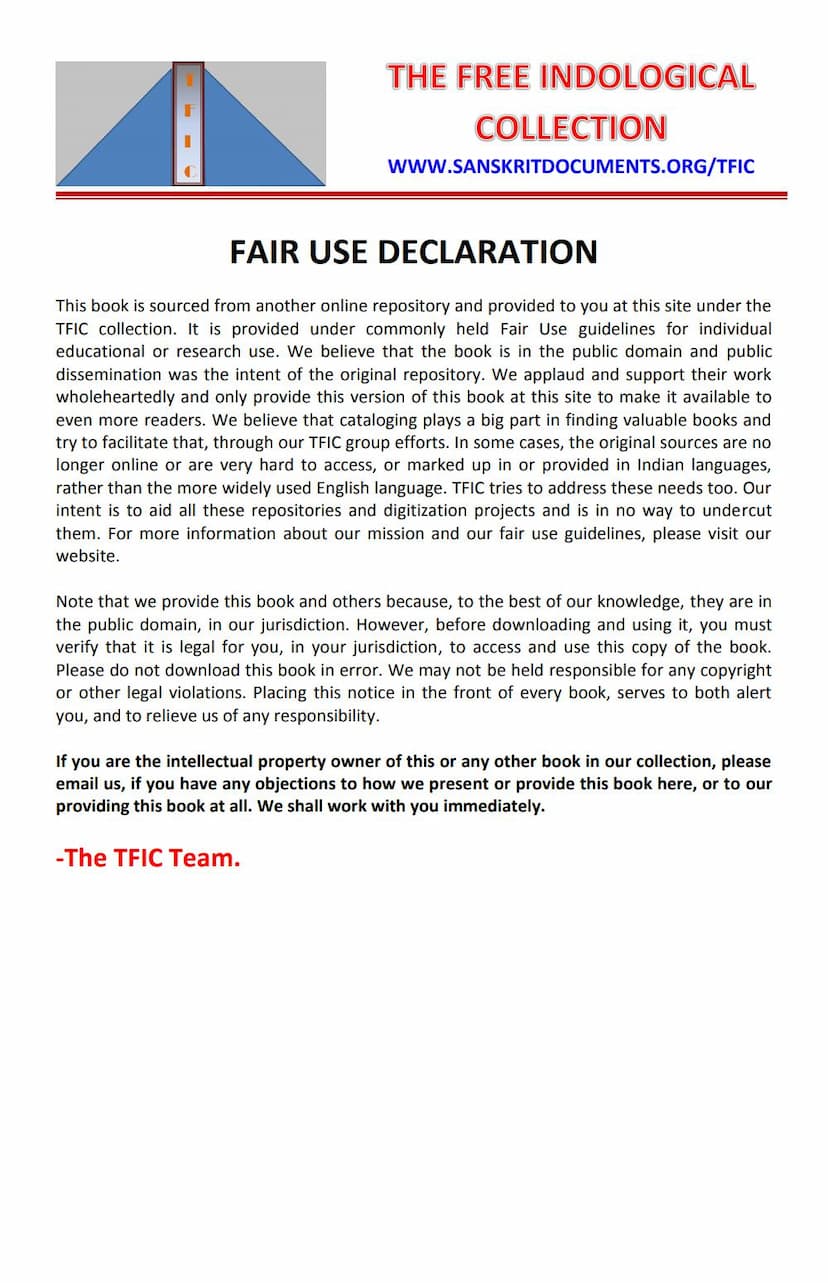Nandi Sutra Aur Anuyogadwara Sutra
Added to library: September 2, 2025

Summary
Here's a comprehensive summary of the Jain text "Nandi Sutra aur Anuyogadwara Sutra" based on the provided content:
Book Title: Nandi Sutra aur Anuyogadwara Sutra Author(s): Bhadraben, Shobhachad Bharilla Publisher: Prem Jinagam Samiti Mumbai
This publication, released in commemoration of the 2500th Nirvana Mahotsav of Lord Mahavir, presents two important Jain Agamas: the Nandi Sutra and the Anuyogadwara Sutra, along with a Gujarati translation. The translation was done by Kumari Bhadraben and edited by Pandit Shobhachand Bharilla. The publication was facilitated by the Prem Jinagam Prakashan Samiti, Ghatkopar, Mumbai, with significant inspiration and financial support from Shri Premji Hirji Gala.
Core Content and Themes:
The book delves into fundamental concepts of Jainism, primarily focusing on knowledge, classification of substances, and the means of understanding the scriptures.
I. Nandi Sutra:
The Nandi Sutra is described as an "invaluable treasure of knowledge." Its primary focus is the detailed exposition of Jñana (Knowledge), its various types, and its classifications.
- Praise of the Sangha: The sutra begins with a profound and moving praise of the Sangha (the four-fold Jain community) using numerous analogies such as a city, chariot, chakra, lotus, moon, sun, ocean, and Meru mountain. It highlights the Sangha's immense virtue and importance for the propagation of Jain teachings.
- Types of Knowledge (Jñana): The Nandi Sutra meticulously details the five types of knowledge in Jainism:
- Abhinibodhika Jñana (Sensory Knowledge): Knowledge gained through the senses.
- Shruta Jñana (Scriptural Knowledge): Knowledge derived from the scriptures (Dvadashangi).
- Avadhi Jñana (clairvoyance): Knowledge of form, time, and space, extending beyond the reach of the senses.
- Manah Paryaya Jñana (Telepathy): Knowledge of the thoughts of others.
- Kevala Jñana (Omniscience): Absolute and complete knowledge.
- Sub-classifications of Knowledge: The text further elaborates on the nuances of these knowledge types, particularly detailing Avadhi Jñana (clairvoyance) and Manah Paryaya Jñana. The explanation of Avadhi Jñana covers its various classifications such as Bhavapratyayika (due to birth-circumstances) and Kshayo-pashamika (due to destruction-subsidence of karmas), and further categorizes them based on their scope (anticipatory, mid-scope, etc.), direction, and magnitude (spatial and temporal).
- Buddhi (Intellect): The Nandi Sutra also discusses the types of intellect (Buddhi): Utpattiki (innate), Vainayiki (due to discipline), Karmja (due to karma), and Parinamiki (due to transformation). Numerous illustrative stories are provided for each type of intellect, emphasizing the practical application of wisdom.
- Sadharmas and Vadharmas: The text implicitly contrasts the qualities of a good disciple with those of a bad one, using analogies and stories to illustrate how to cultivate spiritual virtues and avoid pitfalls.
II. Anuyogadwara Sutra:
The Anuyogadwara Sutra is considered a key text for understanding the methodology and principles of scriptural interpretation. It provides the "four doors" or methods to enter and understand the vast Jain literature.
- Four Doors of Interpretation (Anuyoga): The Anuyogadwara Sutra emphasizes the importance of four fundamental concepts for understanding the Agamas:
- Upakrama (Introduction/Initiation): This involves understanding the initial setup, purpose, and context of a scripture or a section within it. It covers aspects like the title, author, subject matter, and intended audience.
- Nikshetra (Classification/Placement): This refers to the various ways in which a concept or substance can be classified or placed within the Jain philosophical framework. It includes classifications based on name (nama), establishment (sthapana), substance (dravya), and state/form (bhava).
- Anugama (Sequence/Inference): This involves understanding the logical flow, causal relationships, and sequential aspects of Jain doctrines. It relates to how concepts follow each other or are connected through inference.
- Naya (Standpoint/Viewpoint): This is a crucial concept in Jain logic, referring to the different perspectives or standpoints from which reality can be viewed. The sutra highlights the importance of understanding the seven Nayas (Naigama, Samgraha, Vyavahara, Rujusutra, Shabd, Samabhirudha, Evambhuta) to grasp the multifaceted nature of reality.
- Types of Anuyoga: The sutra also classifies discourse (Anuyoga) into four types:
- Charna Karan Anuyoga: Discourse related to conduct and practices.
- Dharma Kathā Anuyoga: Discourse related to religious stories and teachings.
- Ganita Anuyoga: Discourse related to mathematics and calculations (e.g., cosmology, astronomy).
- Dravya Anuyoga: Discourse related to substances and their nature. The Anuyogadwara Sutra itself is placed within Dravya Anuyoga.
- Detailed Exposition: The Anuyogadwara Sutra provides a deep and extensive analysis of these four doors, breaking them down into further sub-categories and explaining their significance in the study of Jain scriptures. For instance, it elaborates on different types of names, forms of intellect, temporal measurements, and spatial dimensions, all within the framework of scriptural interpretation.
Key Aspects Highlighted by the Book's Structure:
- Dedication and Gratitude: The introductory sections express profound gratitude to spiritual preceptors (Gurudev Pranalji Maharaj, Gurunnimaiya Bhavishri, and Ba. Pu. Lilam Bai M.) and patrons like Shri Premji Hirji Gala, acknowledging their instrumental role in bringing this work to fruition.
- The Role of Shraman Vidyapeeth: The preface emphasizes the significant contribution of the Shraman Vidyapeeth, Ghatkopar, where the translation work was undertaken by students under the guidance of learned Acharyas.
- Importance for Dissemination: The book underscores the effort to make these ancient Jain texts accessible to a wider audience, particularly through Gujarati translation, to aid in the study and practice of Jain principles.
- Praise for the Translator and Editor: Special mention and appreciation are given to Kumari Bhadraben for her diligent translation and Pandit Shobhachand Bharill for his scholarly editing and supervision, ensuring the purity and depth of the Agamic meaning.
Overall Significance:
This book serves as a foundational text for understanding the depth and methodology of Jain scriptural study. The Nandi Sutra enlightens the reader about the nature and types of knowledge, while the Anuyogadwara Sutra provides the tools and frameworks for accurately interpreting and internalizing the teachings of the Tirthankaras. Together, they offer a comprehensive guide to the intellectual and spiritual path prescribed in Jainism.